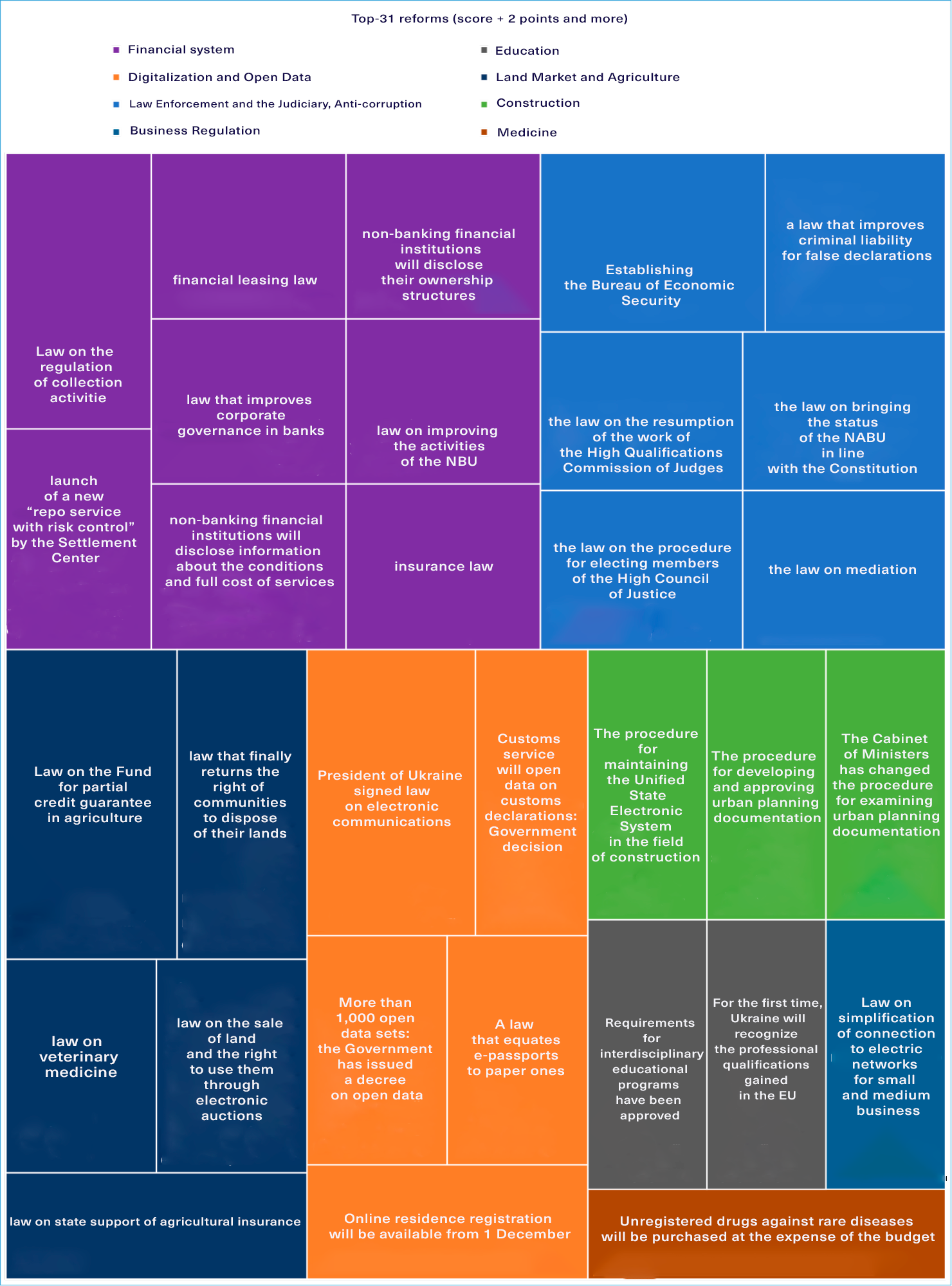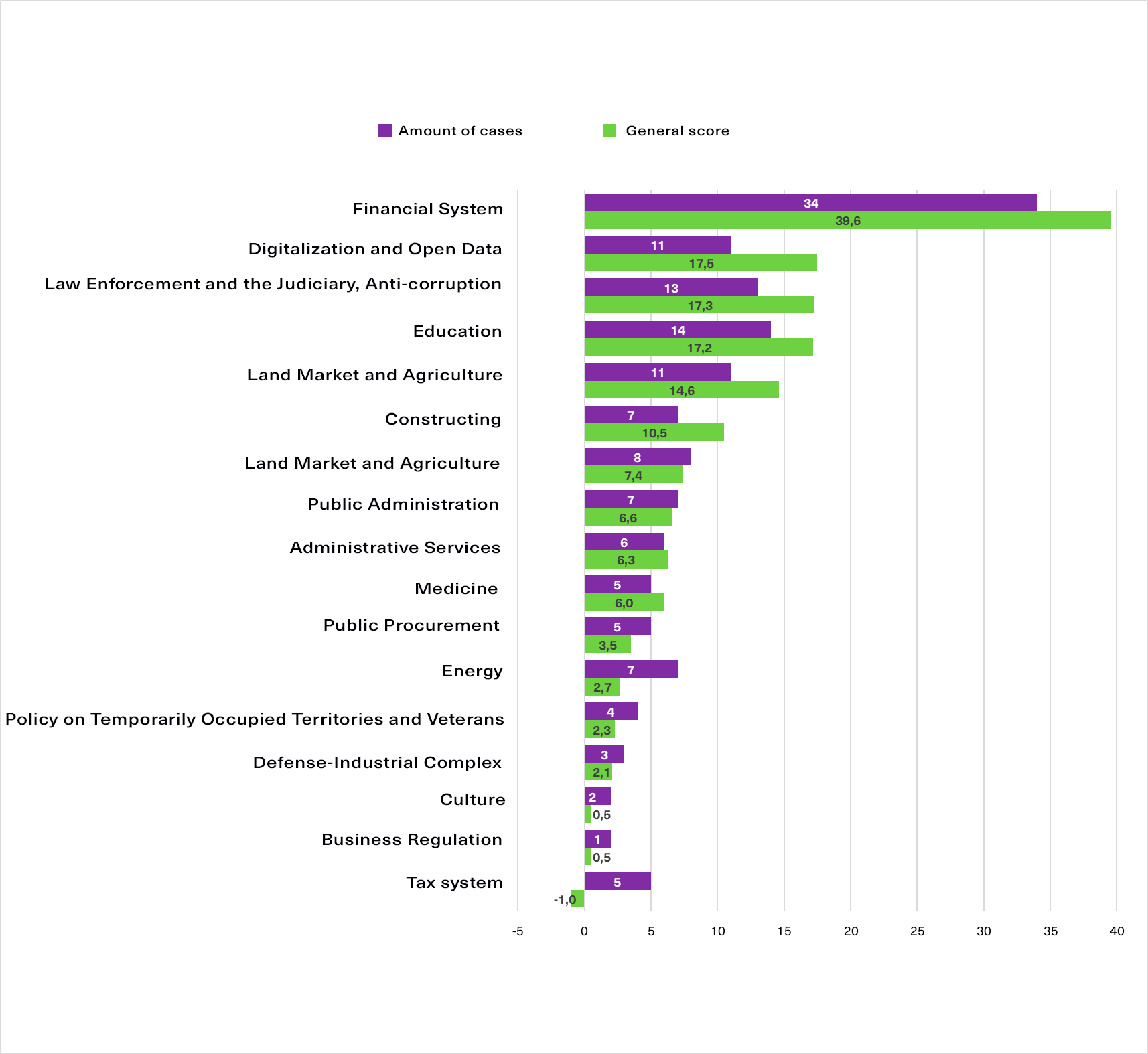A recent study by Vox Ukraine found that a news hook lasts an average of 1.4 days. And the news hook about reforms lives even less. So, it is not surprising that at the end of the year it is difficult to remember what important laws and decrees the authorities have passed in the last 12 months. We decided to find the answer to this question using data from the Reform Index.
Among all the regulations adopted from January 1 to December 19, 2021, the experts of the Reform Index have identified 151 of the most important ones that can change the “rules of the game” in the country. This is slightly more than last year – then we identified 139 such changes. Of these, 136 are positively evaluated, 10 received zero points from experts, and five were anti-reform. In 2021, 31 significant reforms were recorded (Fig.1), which crossed the 2-point mark in the range from -5 to +5. At the same time the highest score of experts was 3.3 points. It was received by the law “On the Fund for Partial Credit Guarantee Fund in Agriculture”. For comparison, last year we recorded 21 such regulations, but the highest score was 4 points.
Figure 1. Top-31 reforms (score +2 points and more)

Data source: author’s calculations based on the data of the Reform Index, period from 1.01.2021 to 19.12.2022
The greatest progress has been made in six areas: the financial system, digitalization, law enforcement and the judiciary, education, agriculture and construction (Fig.2). Next we will consider each area in more detail.
Figure 2. The sum of scores and the number of events by category

Data source: author’s calculations based on the data of the Reform Index, period from 1.01.2021 to 19.12.2022
Financial system: 34 reforms
In 2021, the financial sector received the largest number of reform regulations – a total of 34 documents. They concern the improvement of the National Bank of Ukraine (NBU) and the banking system, protection of consumers of financial services (including borrowers and debtors), as well as simplification of access to credit.
This year the law on improving the activities of the NBU was adopted (Issue 173, +2 points). It is designed to improve the internal governance of the regulator. The document, in particular, strengthens the requirements for persons appointed to senior positions in the NBU.
One of the important steps was the adoption of a law on improving corporate governance in banks (Issue 166, +2 points). The law requires bank owners to provide the regulator with documents proving their business reputation and financial condition. In addition, the law allows the NBU to require changes in the staff of the supervisory board or management board of the bank in case of inefficiency. This law is important also because its adoption was one of the conditions for continued cooperation with the International Monetary Fund.
The highest score in this area was awarded to the law on the regulation of collection activities (Issue 158, +2.5 points). The document is designed to protect debtors from possible pressure and unfair actions of collectors. It implements clear rules of conduct for creditors and collection companies when settling problematic debts and entrusts the NBU with the function of monitoring their compliance. Thus, only companies included in the register created by the regulator will be able to engage in collection activities. At the same time, financial institutions will be able to engage collectors only if the debtor has agreed to do so when obtaining a loan. The law prohibits collectors from threatening, blackmailing, or misleading a debtor. It is also forbidden to call from a hidden phone number, use an autodial for more than 30 minutes a day, demand payment of debts from relatives or friends of the debtor, etc. All telephone conversations must be recorded and stored by the collection company for three years.
In order to strengthen the protection of consumers of financial services, the NBU obliged banks to disclose in their agreements full information on consumer loans, deposits and conditions for opening and maintaining current accounts (Issue 153, +2 points). It is about the interest rate, term, currency, a complete list of additional services, their cost and the conditions of their possible change.
Non-bank financial institutions came under NBU regulation in July 2020 after the entry into force of the law on “split”, but the restoration of order in this market continues. Thus, in the past year, the NBU obliged macrofinancial organizations to publish in advertising the full cost of loans (Issue 170, +2 points). In addition, the regulator obliged all non-bank financial institutions to disclose information about the owners (Issue 158, +2 points).
Another step towards the regulation of financial services was the updated law on financial leasing (Issue 156, +2 points). The law updates the legislation in the field of financial leasing, strengthens the protection of lessors and at the same time obliges them to inform consumers about the cost and terms of leasing before the conclusion of the contract – by analogy with consumer lending. The document eliminates the need for notarization of leasing agreements with individuals.
It is also important to mention a law on insurance (Issue 175, +2 points). This document provides for a number of requirements for insurers: disclosure of ownership structure, submission of an action plan for three years during the registration of such a company, compliance with the criteria of professional suitability and impeccable business reputation. In addition, the law establishes a system of corporate governance of the company and its solvency.
From 0 to 1 points, experts evaluated regulations related to simplifying access to credit. Thus, the NBU approved an order to expand opportunities for lending to small and medium-sized businesses, as well as mortgage lending (Issue 153, +1 point). The government, in turn, implemented the state program “affordable mortgage at 7%” (Issue 153, +0.5 points), which provides compensation for part of the interest rate on mortgage agreements, and added financial leasing to the state program of reducing the cost of loans “5-7 -9%” (Issue 173, 0 points). Also in 2021, laws were passed on improving the mechanisms for removing banks from the market and satisfying creditors’ claims (Issue 166, +1.8 points) and on payment services (Issue 165, +1 point).
Education: 14 reforms
In 2021, the reforms affected school, vocational and higher education.
Several significant changes concerned higher education and the acquisition of professional qualifications. Since modern vocational education does not always keep up with market demands, workers are often forced to learn on their own. The Cabinet of Ministers allowed the recognition of qualifications obtained in the EU (Issue 162, +2 points), created an opportunity to officially confirm the qualification obtained outside the educational institution and created a Register of Qualifications (Issue 162, +1.5 points). This will help workers be more flexible in the labor market and facilitate job changes and professional development throughout life.
This year, the piloting of the New Ukrainian School (NUS) reform at the level of basic secondary education began. The NUS concept envisages, in particular, the renewal of the lyceum network. Academic lyceums should be separated from the primary school and have at least four classes of the same year, which will enable high school students to move to specialized education. The relevant law (Issue 166, +1 point) on improving the formation of the network of lyceums was adopted this year.
They also adopted several regulations concerning the property of educational institutions. Let us recall that earlier property of schools was not a subject to privatization and it was forbidden to rent it out not for educational purposes. At the end of this year, a law was passed that allows communities to lease the property of liquidated schools (Issue 173, 0 points), and to use the proceeds for local education.
Digitalization and open data: 11 reforms
The “paperless” regime, bringing order to the state registers and trying to regulate the IT industry by introducing a special tax regime “Diia City” – all this was the subject of lively discussions in 2021.
The highest score was given to the Law “On Electronic Communications” adopted at the beginning of the year (Issue 152, +3 points). It has changed approaches to licensing frequencies and made electronic communications services more transparent to consumers. Previously, companies could only obtain a license for a specific frequency (2G, 4G, etc.), but in the case of the introduction of more modern technology, an additional license had to be issued. The enactment of the law allows operators to use a single license for all technologies. The document also obliges companies-providers to disclose comprehensive and clear information about their services in their contracts with subscribers.
At the end of the summer, the Verkhovna Rada passed a law on the introduction of a special legal regime for IT companies “Diia City” (Issue 166, +1.5 points). In December, parliament passed amendments to the Tax Code, as well as a number of bylaws governing the implementation of “Diia City”. Resident companies of “Diia City” will switch to a simplified taxation system: personal income tax (PIT) – 5%, single social contribution – 22%, military tax – 1.5%. There will also be a PIT discount on the amount of investment in Ukrainian startups. The law provides for the employment of employees by a resident company on the terms of gig contracts. Unlike ordinary service agreements with natural persons-entrepreneurs (PEs), the gig contract can set working hours and rest time. There are also a number of agreements: a non-disclosure agreement and an agreement to oblige the employee to refrain from competing or contracting with other companies during his tenure. By law, the state undertakes not to change these conditions for the next 25 years.
An important change for Ukrainians was the law on equating e-passports with paper ones (Issue 158, +2 points). From now on, the e-passport in the “Diia” application has the same legal force as a physical document. According to the law, every citizen of Ukraine who already has a paper passport or ID card will be able to get it.
Work on the introduction of a “state in a smartphone” continues even at the end of the year. In December, President Zelenskyi signed a law on electronic registers. According to it, public authorities will not be able to demand from citizens information that is already in the registers. One will also not need to bring photocopies or certificates – the exchange of information will be electronic.
Successful implementation of e-government services and overcoming corruption are impossible without streamlining and automating state registers. This exact direction was the focus of the government in 2021. In particular, the Cabinet of Ministers opened more than 1,000 data sets from state registers (Issue 159, +2 points). In addition, according to the government’s decision, the State Customs Service has opened a register of customs declarations (Issue 160, +2 points).
Law enforcement and judiciary, anti-corruption: 13 reforms
The changes in the judicial system adopted this year concerned primarily the correction of last year’s main anti-reform – the decision of the Constitutional Court of Ukraine (CCU) on the unconstitutionality of anti-corruption legislation on the declaration of income and property (Issue 146, -4.5 points).
In order to correct the legislation, in December 2020 a law was passed on the restoration of liability for false declarations, and in July this year – on the establishment of criminal liability for false declarations (Issue 165, +2 points). This law is an attempt to restore criminal liability for submitting inaccurate information in the declaration. Deputies first introduced it in 2014 with relevant amendments to the Criminal Code, but in 2020 the CCU declared these provisions unconstitutional. According to this year’s law, declarants will face criminal liability if they do not show income of UAH 4.5 million or more.
An important change in law enforcement agencies was bringing the status of NABU in line with the Constitution (Issue 173, +2 points).
Another important document in the direction of improving the declaration is the law on the resumption of full-fledged work of the National Agency for the Prevention of Corruption (Issue 150, +1.5 points).
In addition, in 2021 a law was passed defining new principles for the formation of the High Qualifications Commission of Judges (HQCJ) – a collegial body that selects, evaluates and recommends candidates for judges (Issue 166, +2 points). The HQCJ has not been operational since 2019 and consisted of two-thirds of judges who were unwilling to objectively evaluate and dismiss their colleagues. This undermined public confidence in the judiciary. Therefore, the law provides for the establishment of a competition commission to select members of the HQCJ, in which internationally recognized experts will have a casting vote. The commission will consist of an equal number of representatives of the Council of Judges of Ukraine and international experts. The commission will nominate at least two candidates for each vacant position of a member of the HQCJ, and the final appointment must be made by the High Council of Justice (HCJ).
Potential candidates for the HCJ will now also be screened in accordance with the law passed in July (Issue 166, +2 points). The document provides for a one-time assessment of the compliance of HCJ members with the criteria of professional ethics and integrity by the Ethics Council with the participation of international experts.
This year, a new body was launched to combine law enforcement and analytical functions in the field of financial crime investigation – the Bureau of Economic Security (BES) (Issue 157, +2.5 points). It is expected that the creation of a new body will stop the illegal pressure of law enforcement on business during the investigation of economic crimes.
Agriculture: 11 reforms, 1 anti-reform
Significant changes in agriculture in 2021 were primarily related to the adoption of laws to fully launch the land market and expand farmers’ access to credit.
The highest score was given to the Law on the Fund for Partial Credit Guarantee in Agriculture (Issue 173, +3.3 points). The law aims to facilitate farmers’ access to financial resources so that they can take full advantage of land market opportunities. The document provides for the creation of a Fund that will be able to provide guarantees to farmers for 50% of the debt for up to ten years. This should not only reduce the cost of credit for farmers, but also reduce the risks of financial institutions.
Another law that should simplify the access of farmers to financial services is the law on state support of agricultural insurance (Issue 165, +2 points). According to it, farmers will be able to receive from the state 60% compensation for the cost of insurance payments. Support applies to crops, harvests and perennials, as well as animals. According to Oleh Nivyevskyi, a professor at the Kyiv School of Economics, state support for agricultural insurance is one of the few reasonable opportunities for state support, as insurers find it difficult to assess the likelihood of an insured event, thus they rather choose not to insure agrarians whatsoever.
Another important legal act is the Law on Land Decentralization (Issue 161, +2.5 points). It gives communities the right to dispose of land outside settlements. The decision to transfer communal lands to private ones now requires the support of at least 2/3 of the votes of the general membership of the local council (previously it was half). Local authorities will also control the intended use of land and issue a permit to change the purpose of particularly valuable land.
One of the key elements of the “land” reform package this year was the law on the sale of land through electronic auctions (Issue 163, +2 points). According to it, the sale of rights to use communal or state lands is allowed only through e-auctions in the system Prozorro.Sale. Transferring physical auctions into electronic ones will increase competition in tenders, and thus increase the price and efficiency of land use.
A step towards the harmonization of Ukrainian legislation with European one is the Law on Veterinary Medicine (Issue 156, +2 points). The law reduces the number of export permits and shortens the terms of their issuance – and thus promotes the export of Ukrainian livestock products.
We also noted one anti-reform that has an impact on the agricultural sector – the law on reducing the VAT rate on certain types of agricultural products from 20% to 14% (Issue 155, -1 point). The purpose of the law is to combat the fictitious overstatement of the tax credit (so-called “twists”). Although this change has benefited traders and exporters, it has led to higher commodity prices for finished goods producers, which in turn has created risks of rising food prices. To reduce the negative impact of this law, the Verkhovna Rada adopted amendments to it on July 1, which refunded 20% VAT on taxes on supplies to Ukraine of cattle, pigs, sheep, whole milk, sugar beets and a number of other products. But even in this form, the law contradicts Ukraine’s commitments to the IMF.
Construction: 6 reforms
To reduce corruption risks and increase transparency in the field of urban planning, in 2019 a law was adopted on the creation of a Unified State Electronic System in the field of construction. In 2021, the procedure for maintaining this system was approved, which allowed its full launch. The system allows to obtain services for the completion of documents at all stages of construction on the principle of “single window” on the portal Diia. The expansion of the functions of the e-system is continuing. In particular, on December 1, the Ministry of Finance added the possibility of drawing up in the Diia town-planning conditions and restrictions. This document is required to obtain a permit for the construction of apartment buildings and most industrial facilities.
In addition, in 2021 the Cabinet of Ministers approved the procedure for examining comprehensive plans for spatial development of communities (Issue 169, +2 points). A comprehensive plan is a general plan of the settlement together with the documentation on land management and town-planning. It must ensure the sustainable development of the amalhamated community, taking into account the interests of its inhabitants, the state and business. Another resolution of the Cabinet of Ministers provided that such plans will be created electronically, and changes to them can be made no more than once a year (Issue 168, +2 points).
And about the bad things: anti-reforms
Energy
Energy became the leader in anti-reforms in 2021. Experts have identified two changes in this area that worsen the “rules of the game” in the country – the law on financial stability in the natural gas market (Issue 167. -1 point) and the withdrawal of gas from the law on public procurement (Issue 152, -0, 25 points).
The first law provides for the restructuring of the debt of gas suppliers to NJSC Naftogaz of Ukraine in the total amount of over UAH 93 billion. As a result of the restructuring, the payment period will be postponed to the future, and part of the debt may be written off. In particular, the debt formed due to the difference in tariffs, fines and penalties will be written off. Some experts negatively assessed this law, as it will lead to Naftogaz not receiving funds in the near future for the implementation of investment projects – the development of new fields and production of its own gas, as well as reduce incentives to systematically solve debt problems. In addition, writing off debts will create an additional burden on the budget.
The second law, according to experts, is controversial. On the one hand, it allows gas market participants to effectively resolve current imbalances, as well as promote the development of commodity exchanges, pricing and increase competition on them. At the same time, this norm may have a negative impact on procurement procedures by budgetary institutions and state-owned enterprises, as there is a risk of overpricing.
Medicine
At the end of the year, the medical sphere also got an anti-reform. The Cabinet of Ministers has adopted a resolution aimed at eliminating the disparity between the amount of remuneration of medical staff and heads of health care facilities (Issue 175, -0.5 points). From now on, the salary of the head cannot exceed 60% of the average salary of medical workers. Such government regulation threatens the autonomy of medical institutions and violates the principles of medical reform. However, there have been positive developments in the medical field as well. This year, the authorities worked on the organization of procurement of medicine for orphan patients. First, the Cabinet of Ministers adopted a resolution on controlled access agreements (Issue 153, +2 points). Demand for innovative drugs can significantly exceed supply, which increases their cost. Governments try to negotiate discounts with monopoly manufacturers, for which they enter into controlled access agreements. Discounts received by the country from the manufacturer in such an agreement are confidential. With the introduction of such a change, the state will be able to purchase or partially cover the cost of expensive innovative drugs for serious and rare diseases such as spinal muscular atrophy (SMA) at the expense of the state budget. Secondly, at the end of the year the Cabinet of Minister allowed to buy certain list of medicines for rare diseases at public expense, even if they are not registered in Ukraine, provided they are registered in countries with strict regulatory conditions (EU, USA, Canada, etc.).
Tax System
One anti-reform was in the tax sphere. The tax amnesty received a negative assessment (Issue 165, -2 points). Its implementation did not bring much money: as of December 21, Ukrainians declared a little over UAH 1 billion, of which the Ukrainian budget received UAH 51 million. At the same time, such a move could create incentives for Ukrainians to evade paying taxes in anticipation of the next “forgiveness”.
Conclusion
In 2021, the government mostly finalized the reforms launched last year. Important banking laws were passed, steps were taken to further build the “state in a smartphone”, and land reform continued. In addition, in the third quarter, the authorities resumed the long-awaited judicial reform, which, however, will take a long time and effort to complete. However, its successful completion would be a significant achievement of the current government. Other expected changes next year are continued law enforcement reform, continued privatization, business facilitation, and continued health and education reforms.
P.S. We do not tire of repeating that the adoption of progressive laws is only the first step towards implementing reforms. The main thing is the implementation of reforms. Thus, although the laws on “restarting” judicial reform have received high marks, their implementation has not yet begun, there are high risks that the BES will become only a reincarnation of the tax police, not an analytical body, as planned, and the vertical anti-corruption bodies (NABU, SAPO and HACC), apparently, did not fully function even one day. However, since the implementation of laws, as opposed to their adoption, must take place on a daily basis, it can be ensured primarily by citizens and businesses. We call on those who are not indifferent to reforms in Ukraine to follow the implementation of legislative changes that concern you the most.
Attention
The author doesn`t work for, consult to, own shares in or receive funding from any company or organization that would benefit from this article, and have no relevant affiliations



